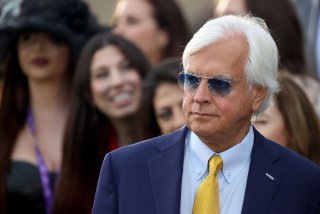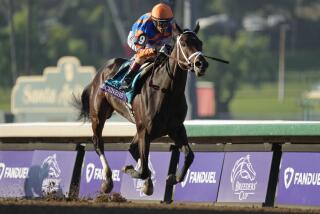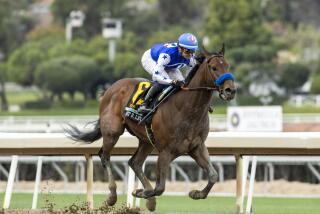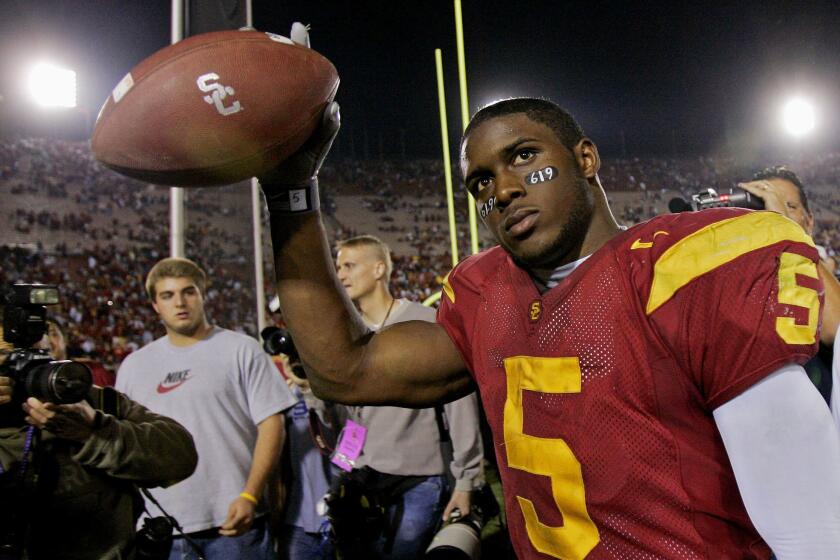American Pharoah vs. Secretariat: Breeders’ Cup Classic is legacy race
When they go to the gate for the Breeders’ Cup Classic on Oct. 31 at Keeneland in Lexington, Ky., it will have taken 42 years for horse racing to get its best shot at Secretariat’s legacy.
In that gate will be American Pharoah. His trainer, Bob Baffert, calls him “our modern-day Secretariat.”
Secretariat’s 31-length victory in the Belmont that June of 1973 — in an era when horse racing was not only the sport of kings, but perhaps of the people — put him on a pedestal from which he may never move.
Seattle Slew and Affirmed won Triple Crowns after Secretariat, in 1977 and ‘78, and will always have their proponents in the best-ever debate. But neither had the chance American Pharoah has to finish in a legend-making blaze of glory. Nor did Secretariat.
The first Breeders’ Cup was in 1984. Since then, racing has gathered its best to an annual event of marquee races for gold-mine purses.
The feature is the $5-million Classic. Slowly, the race has worked its way into the same breath as the Triple Crown. It is not, nor likely will be, as prestigious. But it’s a huge deal.
American Pharoah has raced just 10 times, winning eight and finishing second last month at the Travers at Saratoga. It is not heresy to compare a horse to Secretariat if it lost a race after the Triple Crown.
Secretariat did the same thing, losing the Whitney Handicap at Saratoga to a horse named Onion. In the ’78 Travers, Affirmed had put yet another beating on poor Alydar, but was moved back to second place for interfering with Alydar.
Seattle Slew raced at Hollywood Park just a month after his Belmont grand finale in ’77 and was beaten by 16 lengths by J.O. Tobin.
Going strictly on won-loss record, the best major horse was the mare Zenyatta, who won 19 in a row before losing the Breeders’ Cup Classic in her 20th race by a nose hair to a horse named Blame. The Louisville Courier-Journal, perfectly reflecting the mood of the disappointed Churchill Downs crowd that day, bannered one of sports’ greatest headlines: BLAME THE WINNER.
But Zenyatta didn’t run in the Triple Crown season, which will always be racing’s jewel.
In tennis terms, American Pharoah’s quest would be like achieving a Steffi Graf Golden Slam. In 1988, she won all four major tournaments, plus the Olympic gold medal. Nobody else has done that.
On a bright, warm morning at Santa Anita, Hall of Fame jockey Alex Solis walks by. The topic immediately is American Pharoah.
“We aren’t going to see the likes of him for a while,” says Solis, who admires from afar, like all of racing.
Nearby, in the office in his barn where a new plaque on the outside wall touts the “Home of Triple Crown Champion American Pharoah,” Baffert struggles for perspective on his 2015.
“We aren’t going to see the likes of him for a while,” he echoes.
Baffert says the pressure of getting a horse successfully through a Triple Crown season defies description. This was Baffert’s fourth shot. He was second in the Belmont when Silver Charm barely succumbed to a late run in 1997. He was second in the same race a year later, when Real Quiet lost by a whisker. In 2002, War Emblem stumbled out of the Belmont gate and was going nowhere.
“I was beginning to wonder if it wasn’t meant to be,” Baffert says. “Maybe I can’t win a Triple Crown.”
When he did, Baffert said it was almost perfect. He had most of his family around him, and some special memories.
“I wished my parents had lived to see it,” he says, “and I thought a lot about Bob Lewis [Silver Charm’s late owner] and Mike Pegram [Real Quiet’s owner].”
Baffert says he has no regrets about running American Pharoah at Saratoga, even though much had been made of its reputation as the “Graveyard of Champions.” That proved true again.
“It was like bringing the Beatles to town,” Baffert says. “The day before the race, he went for a gallop and there were 15,000-20,000 people watching. That made him think it was a full work and he went too fast. We might have left the race right there.”
He says maybe jockey Victor Espinoza got into too prolonged a battle at the front with Frosted that left little in the tank for American Pharoah to fend off winner Keen Ice.
Earlier this week, Espinoza was spending his time on “Dancing With the Stars,” not riding Pharoahs.
By midmorning, American Pharoah comes out for some nose-petting and pictures.
“He’s sweet, quiet, the best horse I ever had,” Baffert says.
He shakes his head at the thought of that nearby stall being minus the 12th Triple Crown winner. After the Breeders’ Cup, Pharoah goes off to stud.
“I will miss him,” Baffert says. “It will be sad.”
American Pharoah’s legacy is not only what he did, but how he did it. He ran his 10 races in six different states — three in California, two each in Arkansas and New York, and one each in Kentucky, Maryland and New Jersey.
His career was one big road game. Only once did he walk from his stall at Santa Anita to the track and run.
Secretariat was much bigger, barrel-chested, more front-loaded. American Pharoah has nary an ounce of fat — Baffert calls him racing’s Dwight Howard — and a longer stride than most horsemen have ever seen.
When Secretariat died, an autopsy revealed a heart so huge it shocked doctors, who somehow failed to weigh it. Later estimates said it was 22 pounds, more than twice the size of a normal thoroughbred heart.
At the Breeders’ Cup, we will again experience the size of American Pharoah’s heart. From the outside.
Twitter: @DwyreLATimes
More to Read
Get our high school sports newsletter
Prep Rally is devoted to the SoCal high school sports experience, bringing you scores, stories and a behind-the-scenes look at what makes prep sports so popular.
You may occasionally receive promotional content from the Los Angeles Times.







